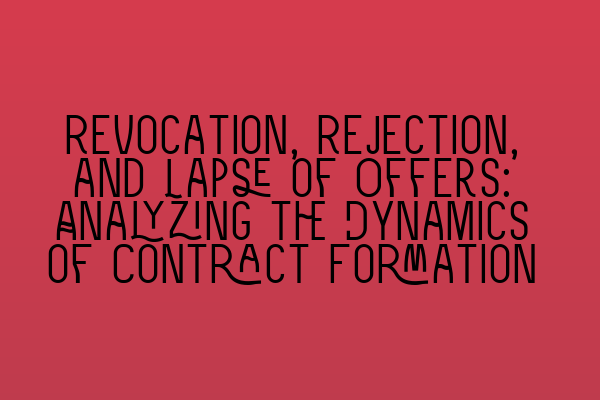Revocation, Rejection, and Lapse of Offers: Analyzing the Dynamics of Contract Formation
Introduction:
In the world of contract law, the formation of a valid and enforceable contract is a fundamental concept that both lawyers and clients must understand. One critical aspect of contract formation is the process by which offers are made and accepted. This process involves various dynamics, including revocation, rejection, and lapse of offers. Understanding these dynamics is essential for solicitors, as it allows them to navigate the complexities of contract formation and protect their clients’ interests.
In this blog post, we will delve into the intricacies of revocation, rejection, and lapse of offers, exploring their definitions, legal implications, and practical application. By the end of this post, you will have a comprehensive understanding of these vital aspects of contract formation.
Revocation of Offers:
When a party makes an offer to another party, they generally have the right to revoke that offer before it is accepted. Revocation means that the offer is withdrawn or taken back. However, it is essential to note that revocation must be communicated effectively to the offeree.
The general rule is that revocation is effective when it is received by the offeree. In other words, if the offeror attempts to revoke an offer but the offeree is unaware of this revocation and proceeds to accept the offer, a binding contract may still be formed. This principle serves to protect offerees from being caught off guard and ensures that they have a fair opportunity to consider the offer before it is revoked.
It is important for solicitors to advise their clients on the proper channels for revoking an offer. Timeliness, clarity, and effective communication are key when revoking an offer to ensure that the revocation is legally valid.
Rejection of Offers:
While the offeror has the right to revoke an offer, the offeree also has the right to reject it. Rejection occurs when the offeree explicitly communicates their refusal to accept the offer. Unlike revocation, rejection terminates the offer immediately and puts an end to the possibility of contract formation.
As a solicitor, it is crucial to guide your clients on how to communicate their rejection effectively. This can help avoid any ambiguities or misunderstandings that may arise if the offeree fails to reject the offer in a clear and definitive manner. By educating your clients on the proper methods of rejection, you can protect their interests and prevent any unintended contractual obligations.
Lapse of Offers:
In addition to revocation and rejection, offers can also lapse. Lapse refers to a situation where an offer automatically comes to an end without either party revoking or rejecting it. Several scenarios can lead to the lapse of an offer:
1. The offer has been expressly stated to lapse after a specific period.
2. The offer expires after a reasonable time if no specific period has been mentioned.
3. The offeror or offeree dies or becomes mentally incapacitated before the offer is accepted.
4. The subject matter of the offer becomes illegal or impossible to perform.
As a solicitor, it is essential to advise your clients on these circumstances to ensure that they do not inadvertently enter into contractual obligations that have lapsed. Understanding the principles of lapse can protect your clients from legal complications and potential disputes.
Conclusion:
Revocation, rejection, and lapse of offers are critical dynamics that significantly impact the formation of contracts. Solicitors must have a deep understanding of these concepts to provide effective legal guidance to their clients.
By navigating the intricacies of revocation, rejection, and lapse, solicitors can protect their clients’ interests and ensure that they have a comprehensive understanding of the contract formation process. This knowledge is vital not only for solicitors but also for clients who wish to navigate the legal landscape successfully.
If you found this article helpful, we invite you to explore some of our related articles:
– [Securing Training Contracts: A Roadmap to Becoming a Solicitor](https://become-solicitor-sra.co.uk/securing-training-contracts-a-roadmap-to-becoming-a-solicitor/)
– [Mentorship for Aspiring Solicitors: Nurturing Talent in the Legal Field](https://become-solicitor-sra.co.uk/mentorship-for-aspiring-solicitors-nurturing-talent-in-the-legal-field/)
– [Legal Challenges and Pitfalls: Navigating the Complexities of the Legal System](https://become-solicitor-sra.co.uk/legal-challenges-and-pitfalls-navigating-the-complexities-of-the-legal-system/)
– [The GDL (Graduate Diploma in Law): A Pathway to Becoming a Solicitor](https://become-solicitor-sra.co.uk/the-gdl-graduate-diploma-in-law-a-pathway-to-becoming-a-solicitor/)
– [Mastering the Solicitor’s Path: Prepare for the Journey Ahead](https://become-solicitor-sra.co.uk/mastering-the-solicitors-path-prepare-for-the-journey-ahead/)
These articles offer valuable insights into various aspects of the legal profession and can further assist you in your journey toward becoming a successful solicitor.
